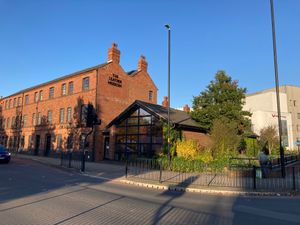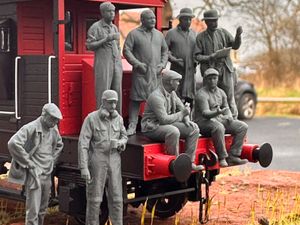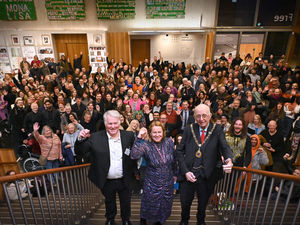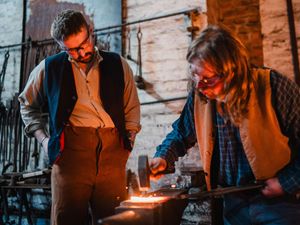Birmingham Hidden Spaces and West Midlands Police host historical lock-up event - review
I went to the Steelhouse Lane Lock-Up open day organised by Birmingham’s Hidden Spaces and West Midlands Police. Never mind real ghosts, the ghosts of this place’s history are the ones which will hunt me forever.

The Steelhouse Lane Lock-Up building is 125 years old but doesn’t look more than 25. The building’s doors were closed last January and its destiny (as the usual story goes, intertwined with speculation and big companies’ money) is yet to be sealed. In the meantime, this beauty’s doors will be opened for two more exclusive dates in July and August of the current year of 2017 - July’s tickets have already sold out.
All history is local, and that is just the obvious reason why old buildings (or things, or even people for that matter) are so precious. Sure enough, old is more difficult to keep; it requires patience, time, money. Old, in its turn offers precisely all those things that it takes away and even some more. In the end, all that is worthy also demands more of us and there’s no way around it.
With the tickets to the open day at the Lock Up vanishing in under two hours, I was very lucky to be allowed in.
To my surprise, there is no guided tour. You are welcomed by the extremely friendly staff which are all happy volunteers; people from all backgrounds who are in love with Brum’s history. Retired and active police workers joined civilians on a heart-melting day of history, communally partaking on a passion which shows in all little details of the journey they prepared for us, the public.
They’ve outlined a pathway suggesting, though not restricting, our visit; you may want to spend the whole day sitting inside one of the dark cells if you’d like to experience what Fred West felt during what is likely to have been one night here before being sent to Crown Court. If that’s your thing, the volunteers won’t mind at all and might even give you some extra info about his possible appearance at the local Magistrate Court in order to help you immerse even further. You may look through the window that leads to the hallway connecting the lock-up to the Magistrate building. You can wonder about the many evil doers who, at least once in their lives, felt actually scared inside the windowless cells. It’s ok, the volunteers won’t mind at all.
Visitors and staff chatted away with affable ease, mainly about Peaky Blinders; or ghosts. People conversed with as much ease as Mr. West killed. Everyone was kind, flexible, accepting, open - something which does not happen without the intervention of a special little ingredient. No, the special little ingredient was not booze you, naughty reader. The special little ingredient was history.
History creates empathy, even more so than booze. History, dare I say, is better than booze. It is, at the very least, longer lasting. History makes you question where your rivals are coming from. What is their story. Even if you don’t like the police, history makes you think about those policemen and women who were outnumbered when the riots broke out. If you are the police, it makes you think about the humiliation minorities feel each time they are stopped for racial or religious profiling. If you are a ghost, history makes you think about how much people always feared you and, hopefully, makes you stop scaring the hell out of everyone.
The whole social awkwardness of which British are so proud disappeared that day at Steelhouse Lane amongst the nuggets of meaty historical gossip, the mixture of accurate facts and mythology, the looking in the eyes of strangers while, well, making a human connection. Regardless of our cultural identity, humans connect through what we find in common. On that 17th June, I personally witnessed dozens of people doing exactly that, connecting through a common subject. History or, even more precisely, Birmingham’s history gets people closer.
I’m Brazilian by birth, Polish on paper and Japanese by a definite refusal to litter – I would commit harakiri before throwing anything on the floor. Having been living in the UK for almost two years now, I have learnt to always expect the inevitable question about my confusing origins. Within the first thirty seconds of talking to anyone regardless of subject, age, race or smell, they will never fail to ask: where are you from? Sometimes the question makes me feel proud, sometimes I just wasn’t expecting it, and sometimes, sadly, it makes me feel like an outsider.
On that historical 17th June, at Steelhouse Lane Lock Up, not one single person felt the need to ask me where I was from. Even I forgot where I was from. There was no time, we had more burning issues to discuss such as the complete lack of historical evidence of any razor blades being sewed up into the Peaky Blinders’ caps. The fact that razor blades were far too expensive for any working-class person to have been able to afford them in the 1890’s was far more important than amenities like someone’s accent. And that, to me, is the best example of how to overcome cultural or language barriers: by doing something on both parts’ interest, by sharing stories, by learning history.
On your way out, don’t miss the Police History memorabilia, giving special attention to Corinne Brazier and Steve Rice’s book “A Fair Cop” which has some interesting anecdotes about the history of female police in the West Midlands. If you are not as excited as the authors by the thorough research compiling important dates and names, just jump straight ahead for the individual stories and you shall have some good fun at the misogyny our grandmothers and even our mothers have been subjected to. You’ll probably even have a chance to chat with the authors themselves who are extremely knowledgeable about, well, history. That is if they’re not ghosts in which case you’ll be enjoying two tours at once, one historical and another paranormal or, shall we say, para-historical?
History is fundamental to our daily lives. We can’t live without it. I wouldn’t, however, say that History is paracetamol to stop bigotry pain. I think it’s more like a healthy diet and exercise kind of thing. And Birmingham’s Hidden Spaces is the project to help you keep your historical diet in impeccable shape.
The tickets to the August open day are yet to become available. If I were you, I’d subscribe to Birmingham’s Hidden Spaces’ newsletter, like their Facebook page, and email the Police Museum to receive an alert as soon as the tickets become available. You’ll become a better person for it. You’ll feel better like when you have a salad instead of McDonald's for lunch.
By Cilene Tanaka





